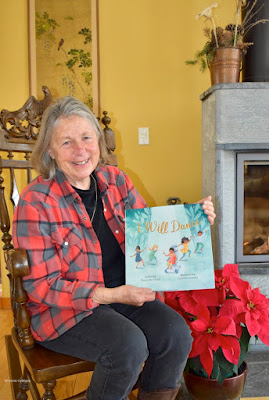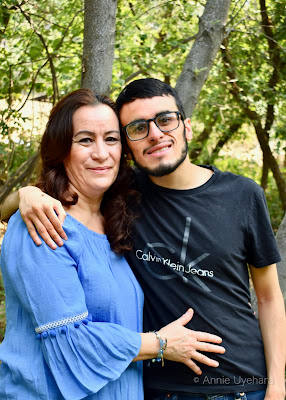Meet Cecelia
At 12 months,
Emily was saying only a few words. She started getting frustrated because she
couldn’t express herself. She was evaluated and Emily was diagnosed with autism
at two and a half. In speech therapy, they told me she would not be able to
talk. I was so determined, that I did not accept the diagnosis. And eventually
she did talk.
My life
became all about Emily. I had tutors come help her with her regular homework
plus any other subjects she was falling behind in. Some days she would say,
“Mom, I don’t want to do this anymore.” Her life was not easy. I regret it
sometimes because she didn’t have a normal childhood. Thanks to that pressure
though, I see how she succeeded in school and why she is who she is right now: original,
brave, enthusiastic, curious, strong, an independent, responsible out going
young lady.
When Emily
entered 4th grade, she hit a wall. Emily was getting lost in the
system and I was just fighting it. I called and made an appointment with the
special education director. He said we could look for a special class for Emily
within the district and I went to observe. There were so many kids with severe
special needs who couldn’t talk or communicate. I thought to myself, “I worked
so hard for Emily and she has come so far. If she comes to this classroom, she
is going to regress.” I told the director this classroom is not for Emily. He
said, “Well, this is what we have, take it or leave it.” I told the director,
“You know what? You don’t know me. I’m willing to change states for my daughter
so she can get a better education.” That is exactly what I did.
When Emily
left for school in Utah, I was in a depression for about a year. I was crying
and didn’t want to go home because I felt so bad. Finally I said, “Cecilia, you
need to stop. You need to do something for yourself and can do something for
other parents.” That is when I thought of the idea for La Esperanza de Emily.
Other parents are going through the same thing, especially when their children
are young adults. Young adults are having a really hard time because society
rejects them. They are afraid of them. I remember Emily said one time, “I want
to be an advocate for these kids because I know what they are going through.”
Her heart right now is around inequality. She is willing to fight for people
with special needs and discriminated people in the LGBTQ+ system.
Emily has
just finished her program in Utah. She’s very independent and she has a plan
for her life. She is planning to go to school, she wants to work and she
recently enrolled in a program for the school of ministry. My plan was for
Emily to return home and we are going to work together on La Esperanza de
Emily. She told me, “No mom, this is my life now.” So I have to let her live
it. Even though she has special needs she is an adult. She deserves respect.
That is part of La Esperanza de Emily, these kids need to be respected and
treated with dignity.
Question: How
have you seen the system support or challenge parents who are trying to
advocate for their children with special needs?
BLOG
At 12 months,
Emily was saying a few words. At one and a half, she started getting
frustrated. She had tantrums all the time because she couldn’t express herself.
At that time, I started thinking, “What is wrong with me? What am I doing wrong
as a mother?” Luckily, I had a niece who had a daughter with autism and she
directed me to The Regional Center. They evaluated her and first diagnosed her
with a speech delay. Then they started to notice something else, so they
evaluated her again. That is when they gave Emily the diagnosis of autism at
two and a half. In speech therapy, they told me she would not be able to talk
and I needed to start learning sign language. I said, “No, she is going to talk!”
I was so determined, that I did not accept the diagnosis. And eventually she
did talk.
My life
became all about Emily. I remember leaving in the morning and I had prepared
dinner to eat in the car so when she finished school I could take her to band,
the swim team, dance class or any of the other activities she did. I also had
tutors come help her with her regular homework plus music and any other
subjects she was falling behind in. I remember something that still breaks my
heart right now. Some days she would say, “Mom, I don’t want to do this
anymore.” I would tell her, “Complain one more time and you’re going to have
another class!” So her life was not easy. I regret it sometimes because she
didn’t have a normal childhood. Thanks to that pressure though, I see how she
succeeded in school and why she is who she is right now: Original, brave,
enthusiastic, curious, strong, an independent, responsible out going young
lady.
In
kindergarten, Emily wasn’t eating her lunch. I asked the teacher about it and
she directed me to the cafeteria lady. I ask her and she told me she didn’t
know. No one knew anything. It was so frustrating. I was determined to help
Emily. I asked the principal for a job. I didn’t care what the job was but he
said there was nothing available. For a year, I kept fighting and finally, he
offered me a very part time job. That is how I started working at the school. I
ended up working in kindergarten with one of the teachers and began getting
educated. I started to learn the system and how the special education runs.
When Emily
entered 4th grade, she hit a wall. She was crying, biting her nails down
to the bone and saying she didn’t want to go to school. She couldn’t explain to
me why though. It turns out that this teacher had 45 students with no help.
Emily was getting lost in the system and I was just fighting it. I called and
made an appointment with the special education director. He said we could look
for a special class for Emily within the district and I went to observe. There
were so many kids with severe special needs who couldn’t talk or communicate. I
thought to myself, “I worked so hard for Emily and she has come so far. If she
comes to this classroom, she is going to regress.” I told the director this
classroom is not for Emily. He said, “Well, this is what we have, take it or
leave it.” I told the director, “You know what? You don’t know me. I’m willing
to change states for my daughter so she can get a better education.” That is
exactly what I did.
When you have
kids with special needs, sometimes not even your own family supports you. When
I was fighting with the school district so Emily could get a better education,
Emily’s father told me something that changed my life forever. He said, “Cecilia
what are you doing? Calm down. Let her go to this school. She’s just a girl.
Eventually, she will get married and have a husband who can support her. I
don’t know why you’re making such a fuss over nothing.” At that point, I
understood, he is not going to support me. I am alone in this and I was like a
single mother.
I came to
Aspen in 2008 on vacation to visit my brother. My sister-in-law told me the
district had very good programs for children with special needs. I thought it
was too good to be true! I went back to California and it took me 3 years to
decide if I should go. My family thought I was crazy. How could I leave my
family, my marriage, my house, my stability? But my marriage at the time wasn’t
working. So I decided I needed to take a year. I needed to do this for my
daughter. That was the hardest year of my life. Being here in Colorado, Emily’s
seizures were uncontrollable. We couldn’t find the right medication. I had to
drive to Denver almost every month. It was bad. At one point, I thought, “What
am I doing here?!” Finding housing in Aspen is really hard and it was hard
working enough to pay for rent. I was really questioning what I was doing here without
the support I needed. On the other hand, I knew this was the best district for
Emily. I didn’t know what to do!
But there are
angels in my life. God puts wonderful people in your life to help you. One of
those angels was the special education director in the district. She was always
there for us, supporting us.
Going back to
those years, I didn’t involve myself with the Hispanic community. It’s not the
same. When I went to the Anglo support groups, it was easy for me to get
support, to talk and to find resources than from the Hispanic community. The
situation required me to find support outside of the Hispanic community and
it’s sad.
When Emily
left for school in Utah, I was in a depression for about a year. I was crying
and didn’t want to go home because I felt so bad. Finally I said, “Cecilia, you
need to stop. You need to do something for yourself and can do something for
other parents.” That is when I thought of the idea for La Esperanza de Emily.
Other parents are going through the same thing, especially when their children
are young adults. It’s very hard because they do not have the resources. They
are always indoors because they don’t have any activities to do. It’s bad, they
isolate themselves. I see it in families we are working with right now. Young
adults are having a really hard time because society rejects them. They are
afraid of them. I remember Emily said one time, “I want to be an advocate for
these kids because I know what they are going through.” Her heart right now is
around inequality. She is willing to fight for people with special needs and
discriminated people in the LGBTQ+ system.
Emily has just
finished her program in Utah. She graduated from high school. She’s very
independent and she has a plan for her life. She is planning to go to school,
she wants to work and she recently enrolled in a program for the school of
ministry. My plan was for Emily to return home and we are going to work
together on La Esperanza de Emily. She told me, “No mom, this is my life now.”
So I have to let her live it. It’s not easy but I support her from far away. We
talk every day. There is a reason she in California. Even though she has special needs she is an
adult. She deserves respect. That is part of La Esperanza de Emily, these kids
need to be respected and treated with dignity.
Join the conversation. We want to hear YOUR voice.
How have you seen the system support or
challenge parents who are trying to advocate for their children with special
needs?
Valley Life for All, A Non-Profit.
Reach us at: 970-319-1279
#valleylife4all #voiceability4all
Resources:
Post Independent Article
Vail Daily Article
Vail Daily Article
Sponsored by:






Comments
Post a Comment